The biggest challenge many Nigeria households have faced in the last one year is the enduring high cost of food. Many popular staple foods in the country that were hitherto affordable, have experienced sharp spike in prices, making them out of reach for many consumers.
According to data released by the National Bureau of Statistics (NBS), on Wednesday, the average price of 1kg of brown beans has risen year on year (YoY), by 271.55 per cent from N692.95 in August 2023 to N2,574.63 in August 2024. On a month-on-month basis, it rose by 5.31 per cent from N2,444.81.
Join our WhatsApp ChannelThe NBS selected Food Price for August 2024, showed that Akwa Ibom State recorded the highest average price of 1kg of Brown Beans at N3,276.79, while the lowest was in Adamawa State at N1,710.92.
Also, the price of white Beans (black eye) rose YoY by 263.04 per cent from N668.22 in August 2023 to N2,425.92 in August 2024. On a month-on-month basis, the average price of 1kg of white beans rose by 5.04 per cent from N2,309.53. It recorded the highest price of N3,103.64 in Bayelsa State.
Yam tuber
The average price of 1kg of Yam tuber rose by 188.31 per cent on a year-on-year basis from N576.39 in August 2023 to N1,661.80 in August 2024. On a month-on-month basis, it however, decreased by -7.82 per cent from N1,802.84 in July 2024.
Rice
Rice is another stable food consumed in most Nigerian households that has also witnessed continuous rice in price over the years. According to the NBS report, the average price of 1kg of local rice increased YoY by 148.41 per cent from N737.11 in August 2023 to N1,831.05 in August 2024, while there was an increase of 3.65 per cent on a month-on-month basis. The average price of 1kg of imported rice went up by 144.63 per cent from N952.06 in August 2023 to N2,329.05 in August 2024. The increase month on month was 6.30 per cent when compared to N2,191.06 recorded in July 2024.
Ofada rice rose YoY by 210.38 per cent from N719.77 in August 2023 to N2,234.06 in August 2024, with Lagos residents paying more for it at N3,251.63.
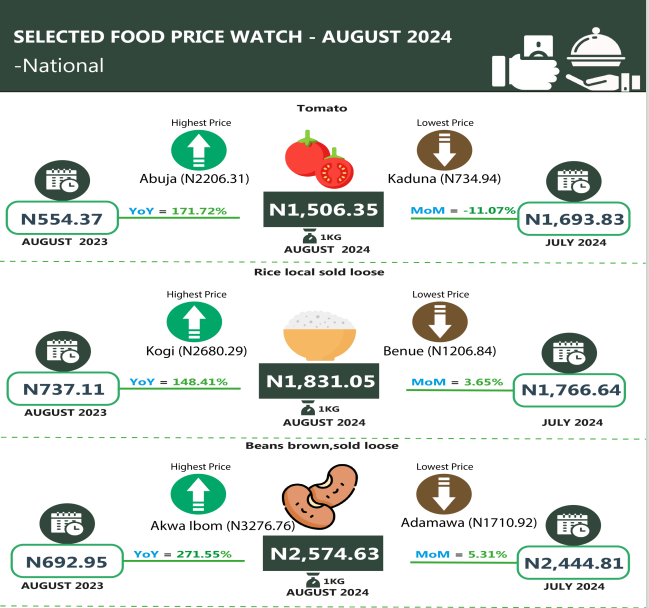
Garri
Garri, another popular stable food made from cassava, which used to be relatively cheaper has witnessed an unprecedented surge in price.
The average price of 1kg of white garri surged YoY by 146.40 per cent from N456.32 in August 2023 to N1,124.40 in August 2024. The August 2024 average price reflects a drop of 2.38 per cent from N1,151.79 recorded in July.
READ ALSO: Garri Price Hits Rooftop In Nigeria As Cassava Production Dwindles
Also, the average price of 1kg of yellow garri rose YoY by 141.76 per cent from N 484.22 in August 2023 to N1,170.65 in August 2024. However, the price dropped by 3.94 per cent from N1,218.68 recorded in July 2024.
Egg
A crate of medium-size eggs (containing 12 pieces) also experienced significant price increases year on year by N121.92 per cent from N1,031.55 in August 2023 to N2,289.19 in August 2024. On a month-on-month basis, the average price of this item rose by 5.48 per cent from N 2,170.17 in July 2024.
Tomato
While average price of 1kg of tomato saw a 171.72 per cent increase YoY to N1,506,35 in August, it is however an 11.07 per cent drop month-on-month from N1,693.83 in July 2024.
Plantain
There was also a notable increase in price of plantain. The average price of 1kg of unripe plantain saw a 160.91 per cent increase YoY from N555.86 in August 2023 to N1,450.32 in August 2024, while the ripped one went up by 152.18 per cent from N591.89 in August 2023 to N1,492.63 in the corresponding period this year. On a month-on-month basis, the price dropped slightly by 0.32 per cent from N1,497.39 in July this year. The data showed that there was a surge in demand for unripe plantain which accounted for the increase in price.
Bread
Bread is another popular food item consumed across the country. Coming in different sizes and forms, the item has also seen a significant surge in price within the last two years due to rising cost of raw materials including flour, and other costs of production.
READ ALSO: Hardship: Long Queues For Bokku! Bread In Lagos
According to the NBS Food Price Watch, the average price of 500g loaf of sliced bread increased by 113.16 per cent from N684.85 in August 2023 to N1,459.85 in August 2024.
Wheat flour
Wheat flour used in producing different items such as bread, pie, cake, doughnut and other pastries has also witnessed a significant increase in price. The average price of 2kg of wheat flour rose by 134.25 per cent YoY from N1,487.88 in August 2023 to N3,485.34 in August 2024.
Irish and Sweet potato
The average price of 1kg of Irish potato rose by 145.13 per cent YoY from N673.42 in August 2023 to N1,650.74 in August 2024. It however, recorded a -7.31 per cent drop when compared to N1,781.01 in July.
The average price of Sweet potato declined by 12.38 per cent from N 970.50 in July to N 850.31 in August 2024.
Fish
Fresh fish is also not left out in the price surge. The average price of 1kg of fresh fish (Tilapia) rose by 150.89 per cent from N 1,479.30 in August 2023 to N3,711.36 in August 2024.
Why some Food items prices dropped
The August 2024 Consumer Price Index (CPI) report released by the NBS showed that food inflation eased to 37.52 per cent from s 39.53 per cent in July 2024.
Analysts attributed the slight drop in prices of some food items to increase in supply in recent times as this is a harvest season for some agricultural products.
There are concerns that the prices might go up after the harvest season as Nigeria do not have good storage infrastructure often leading to significant losses after harvest.
The Central Bank of Nigeria (CBN) Monetary Policy Committee that met earlier this week noted that insecurity, in farming communities, flooding, hike in energy prices, scarcity of petrol which affects transportation cost, remained upside risks to food inflation.
Analysts have said that addressing these challenges would bring down the cost of food, which remains a major contributor to the headline inflation rate.
Victor Ezeja is a passionate journalist with seven years of experience writing on economy, politics and energy. He holds a Master's degree in Mass Communication.

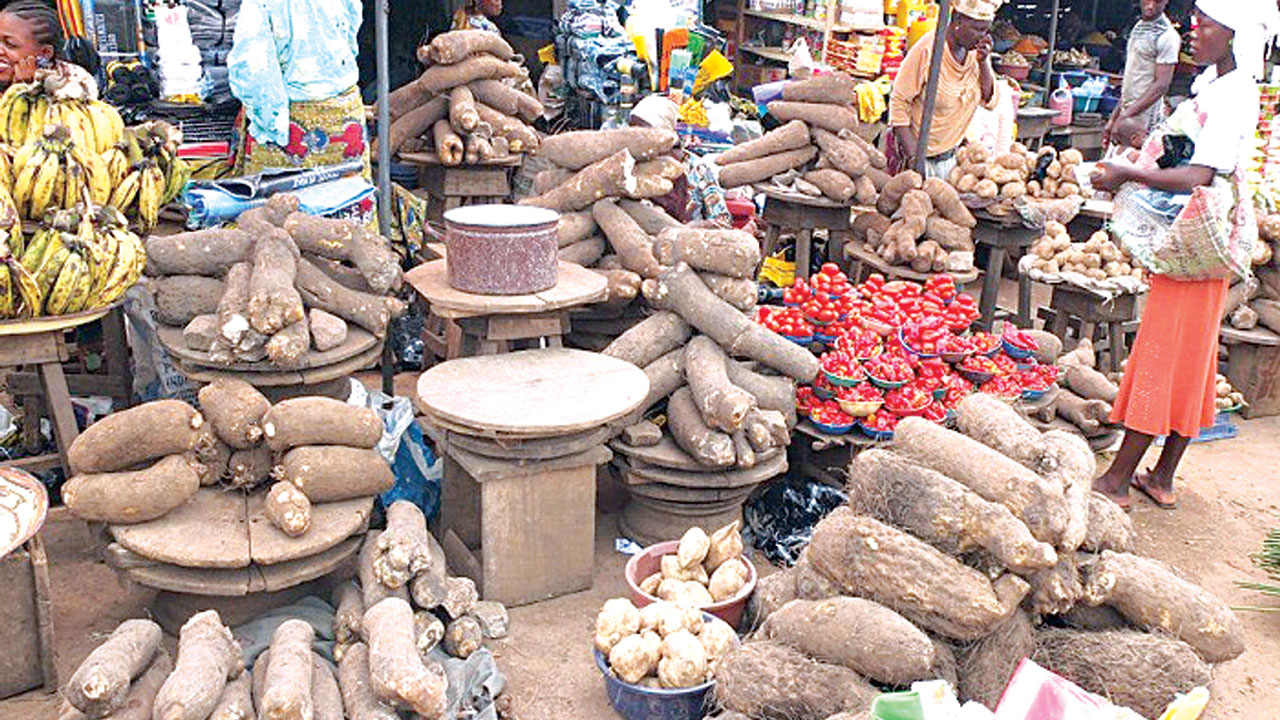



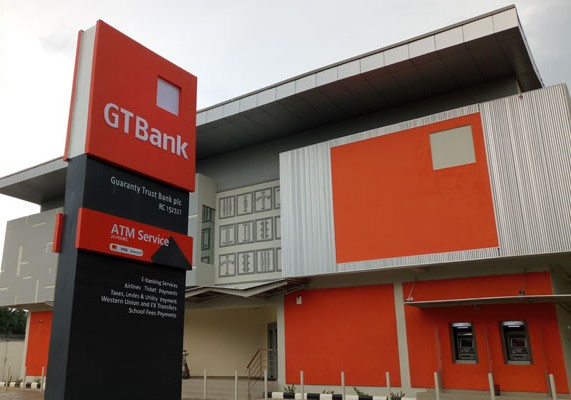
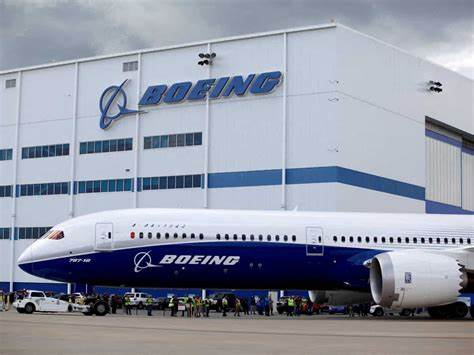







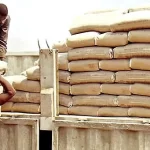


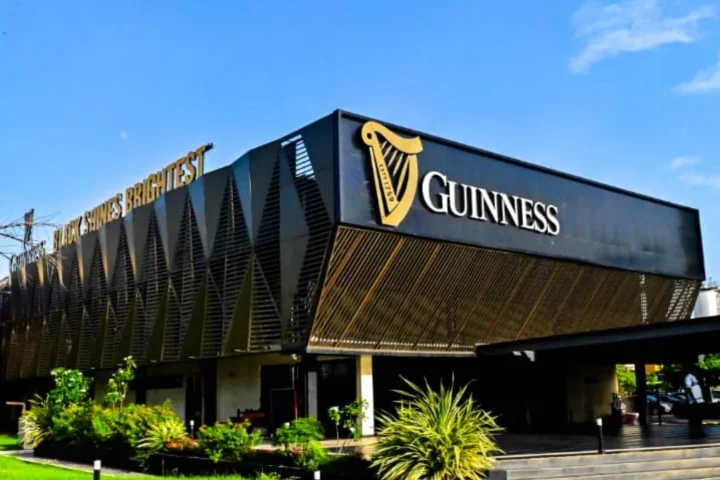
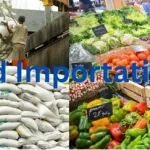
Follow Us